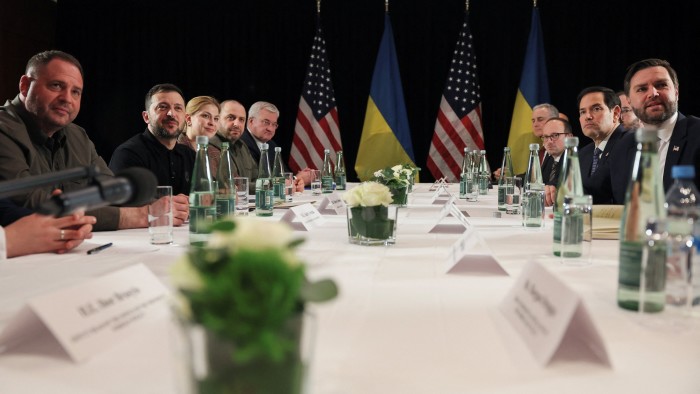Unlock the White House Watch newsletter for free
Your guide to what the 2024 US election means for Washington and the world
US secretary of state Marco Rubio has spoken with Russian foreign minister Sergei Lavrov ahead of high-level talks between Washington and Moscow next week, as relations thaw between the countries.
Rubio, national security adviser Mike Waltz and Middle East envoy Steve Witkoff will meet Russian officials in Saudi Arabia next week, according to a person familiar with the matter.
The high-level meeting comes after US President Donald Trump spoke with his Russian counterpart Vladimir Putin and the two agreed to begin negotiations for ending the war in Ukraine “immediately”.
Rubio “reaffirmed President Trump’s commitment to finding an end to the conflict in Ukraine”, said state department spokesperson Tammy Bruce about the Lavrov call. “In addition, they discussed the opportunity to potentially work together on a number of other bilateral issues.”
The call between Rubio and Lavrov is a significant sign that substantive work has begun on negotiations and the two nations are in regular contact again, with diplomacy normalising. After Russia’s full-scale invasion of Ukraine, high-level diplomatic contact between Washington and Moscow ceased, though the nations have maintained back channels.
The last time the US and Russia spoke at the secretary of state and foreign minister level was just before Moscow’s invasion of Ukraine in early 2022.
Russia’s foreign ministry said Lavrov and Rubio agreed to work together on “restoring mutually respectful interstate dialogue” according to the lines set by Trump’s call with Putin on Wednesday and to set up a meeting between the two leaders.
They also agreed to create “a line of communication to solve the problems in the US-Russia relationship in the interests of removing the unilateral barriers to mutually beneficial trade, economic, and investment co-operation inherited from the previous administration”, in an apparent indication that the US was prepared to roll back sanctions against Moscow over the invasion.
Lavrov and Rubio shared a “mutual willingness to work together on current international issues” such as Ukraine, the Palestinian territories, the Middle East, and other matters, the ministry added. They also discussed lifting mutual restrictions on each others’ embassies and agreed to set up an expert-level meeting to agree “concrete steps on lifting mutual barriers” limiting their work.
The US embassy in Moscow and Russia’s embassy in Washington both operate with significant restrictions on their staffing after several rounds of tit-for-tat expulsions dating back to allegations of Russian election interference in Trump’s first win in 2016.
Trump on Thursday said there was still “a long way” to go in resolving the conflict between Russia and Ukraine, but that his call with Putin marked “a long way forward getting a solution” to the war.
Trump said he had directed Rubio, CIA director John Ratcliffe, Waltz and Witkoff to head the US negotiating team. His Ukraine envoy Keith Kellogg was noticeably absent from this list.
Rhetoric from Trump and other US officials this week about negotiations has alarmed Kyiv and European capitals, which fear they will be sidelined in Washington’s negotiations with Moscow.
The US has asked European capitals to provide detailed proposals on the weaponry, peacekeeping troops and security arrangements they could provide Ukraine with as part of any security guarantees to end its war with Russia.
Washington sent a questionnaire to European governments to scope out the continent’s willingness to protect Kyiv after the war, and gauge the price Europe is willing to pay in exchange for a seat at the negotiating table with Moscow.
Read the full article here




